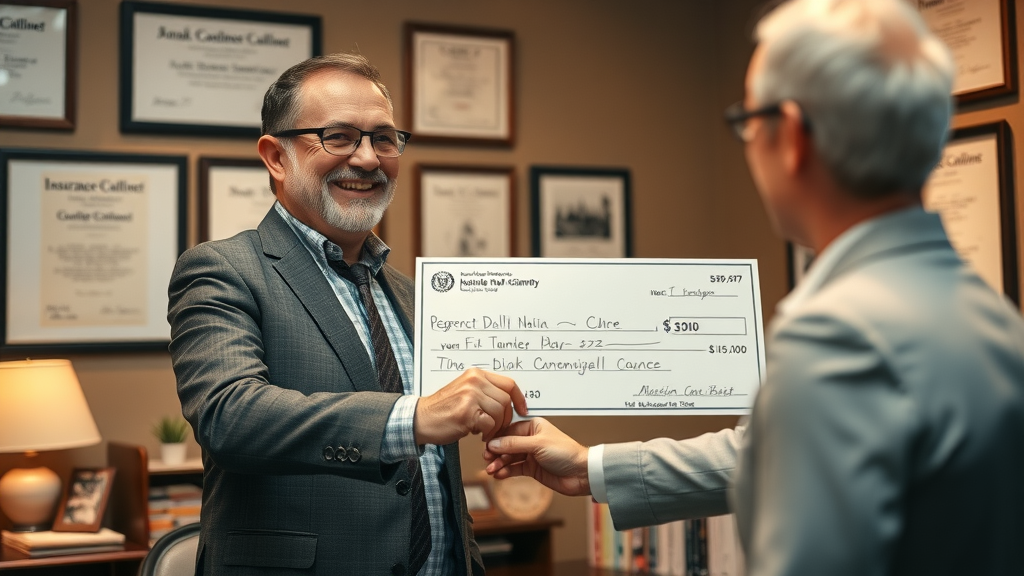Did you know that insurance companies, on average, pay out up to 25% less to claimants who don’t negotiate their claims? Every year, thousands of policyholders leave money on the table simply because they aren’t aware of effective insurance negotiation techniques. Whether you’re dealing with property damage, a personal injury, or a complicated insurance policy, knowing how to negotiate can be the difference between a disappointing settlement and the compensation you deserve. In this comprehensive guide, you’ll discover practical strategies to approach insurance negotiations with confidence, counter lowball offers effectively, and secure a fair outcome.
Why Effective Insurance Negotiation Techniques Matter More Than You Think
Effective insurance negotiation techniques aren’t just a nice-to-have; they are critical for ensuring you aren't shortchanged by insurance companies. Many policyholders assume their insurance adjuster or the company is offering a fair amount, but the reality is that initial offers are usually much lower than what you may be entitled to. This can leave your bottom line severely lacking, especially when dealing with large medical bills, repair costs, or lost wages after an accident.
The power imbalance between individual claimants and insurance companies can be steep. These companies employ expert negotiators whose primary goal is to protect their profits, not your interests. By mastering a few key strategies and understanding the insurance claims process , you can build a strong case and approach negotiations with a clear understanding of your rights. Whether you’re facing a complex injury claim or a straightforward property damage issue, knowing how to negotiate puts you in a stronger position from the very beginning.
A Look at the Numbers: Surprising Statistics on Insurance Companies and Negotiating with Insurance
When it comes to negotiating with insurance companies, the statistics are eye-opening. For example, claimants who engage in active negotiation have been shown to secure settlements up to 40% higher than those who simply accept the initial offer. Insurance adjusters are trained to handle claims efficiently and aim for the lowest payout possible, whereas policyholders are often unfamiliar with their own insurance policy and the full value of their claim. This lack of awareness can be costly, especially in situations involving significant damage claim or personal injury.
- Over 60% of insurance claims settlements increase when claimants provide thorough documentation and organized evidence.
- Less than 30% of policyholders consult a public adjuster , yet those who do often receive a substantially higher payout.
- Many insurance companies set aside reserves expecting policyholders won’t push back on initial offers —indicating negotiation is part of their process.
- Effective negotiation is proven to reduce claim processing time in many cases, especially for personal injury claims .

Mastering the Basics of Effective Insurance Negotiation Techniques
Building a strong foundation for effective insurance negotiation techniques begins with a clear understanding of your policy and the claims process. Insurance policies are written with complex language, often designed to protect the interests of the insurance company . As a policyholder, it’s essential to educate yourself about the terms, coverage limits, exclusions, and the responsibilities you have when filing an insurance claim . This not only empowers you in the negotiation process but also helps you avoid pitfalls that could compromise your claim or reduce your final payout.
The next step in mastering the basics is understanding the key roles involved. An insurance adjuster works for the company's interests and manages your claim, while a public adjuster is hired independently to represent your interests. Knowing this difference ensures you approach negotiations with a clear advantage and can argue for fair compensation . Remember that your outcome often hinges on how well you document your damage claim , medical expenses, and correspondence with the insurance company.
Understanding Your Insurance Policy and Insurance Claims Process
Every successful insurance negotiation starts with a clear understanding of your insurance policy and how the claim process works. Review every section, especially coverage details and exclusions, so you know what you're entitled to claim. When an incident occurs, promptly notify your insurer and keep track of all communication. Submit your claim with complete details on property damage or personal injury —the more comprehensive your information, the stronger your negotiating position.
Familiarizing yourself with the claim process also means understanding important milestones—like submitting your evidence, waiting for the initial evaluation, and following up on any requests from the insurance adjuster . Staying organized and responsive can help prevent unnecessary delays that might harm your claim. By treating every interaction as a step in successful negotiation, you make it easier to present a credible and persuasive case for the compensation you deserve.
Key Terms: Insurance Adjuster, Public Adjuster, and Fair Compensation
During insurance negotiations, you’ll encounter various professionals whose titles can be confusing. The insurance adjuster is usually the first point of contact for your insurance claim, tasked with investigating the damage, assessing costs, and making an initial offer. Remember, their allegiance is to the insurance company. In contrast, a public adjuster is an independent expert you can hire to ensure your damage and injury claims are properly valued, helping secure fair compensation .
It’s important to know you have rights as a policyholder. If discussions with an insurance adjuster feel unbalanced, bringing in a public adjuster may help level the playing field, especially in complex property damage or high-value injury cases. Their role is to advocate for your interests, present strong evidence, and push for a result that meets your needs—not just the bottom line for the insurance company.
| Insurance Company Adjuster | Public Adjuster |
|---|---|
| Works for the insurance company Evaluates insurance claim value based on company policies Offers settlements aligned with company’s best interests |
Hired independently by policyholder Reviews and documents all damage and loss Negotiates for fair compensation on your behalf |
Step-by-Step Guide to Effective Insurance Negotiation Techniques
An effective negotiation approach means tackling each phase of the process thoughtfully. Begin by preparing a thorough insurance claim with clear evidence and supporting documentation. Ensure that each stage—from filing your claim to responding to the initial offer—is completed with care and attention to detail. By following these steps, you’ll ensure you’re always building on a strong case and maintaining leverage in all insurance negotiations .
Remember, patience and professionalism are key to the negotiation process . Insurance companies anticipate some resistance from policyholders, so stay calm and assertive while presenting your evidence. Don’t settle for less just to conclude the process quickly; with the right tactical moves and documentation, you can significantly increase your eventual payout.
Preparation: Building a Strong Insurance Claim
The cornerstone of any successful negotiation is effective preparation. Start by gathering all available documents related to your damage claim or injury case, including repair estimates, receipts, photographs, and relevant bills. Creating a comprehensive inventory of your losses makes it difficult for the insurance company to dispute the value of your insurance claim .
Meticulously checking your insurance policy to verify what is covered (and what isn’t) helps build credibility for your claim. Be ready to support your numbers with independent valuations, such as repair invoices or medical statements. Having a clear understanding of exactly what you are entitled to puts you in the best position during the negotiating process .
Documenting Damages and Personal Injury for Successful Negotiation
Proper documentation is your strongest ally in any insurance negotiation . For personal injury or property loss, gather and organize photographs of the incident, receipts for repairs and replacements, and all related medical bills . Obtain written estimates or reports from any professionals involved—be it contractors for property damage or doctors for injury claims .
Don’t forget to keep a log or diary detailing the events of the accident and how it has impacted your life or property. This firsthand account offers a persuasive narrative during negotiations, making it easier to counter arguments from the insurance adjuster about the scope or severity of your claim. The more evidence you provide, the harder it is for the insurer to offer less than what you deserve.

Communicating with Insurance Companies: Essential Do’s and Don'ts
Communicating effectively with insurance companies sets the stage for a more favorable settlement. Always keep communication formal and in writing when possible, as this creates a verifiable record for future reference. Stick to the facts about your insurance claim and avoid emotional or speculative statements. Ask direct questions when something is unclear, and politely insist on written responses from the insurance adjuster regarding decisions or settlement amounts.
On the other hand, avoid providing unnecessary details or opinions, and never agree to a recorded statement without reviewing your policy or consulting a professional. If the insurer tries to rush you to settle or pressures you during negotiations, stand your ground. A calm, businesslike approach not only shows your seriousness but often leads to a more respectful and productive interaction.
Responding to the Initial Offer: Countering with Evidence
The initial offer from the insurance company is often just a starting point and rarely represents the compensation you deserve. Never accept the first proposal without reviewing your evidence and consulting your documents. Analyze how the insurer calculated the offer, and, if necessary, ask for a breakdown or explanation. Prepare a counter-offer supported by receipts, medical bills, repair estimates, and any other documentation that supports a higher settlement.
In your counter-offer, address specific shortcomings in the initial offer . Demonstrate how your evidence supports your requested amount and explain why it is fair given the circumstances. If your documentation is well-organized and clearly presented, the insurance company is much more likely to move toward your number as negotiations continue.
Visual walk-through: Real-life insurance negotiation scenario and response strategies
Advanced Effective Insurance Negotiation Techniques
If you find negotiations stalling or the insurer offering an unreasonably low settlement, advanced tactics can help break the impasse. Professional negotiators understand the importance of persistence, strategic timing, and the ability to leverage documentation for additional credibility. By staying patient and demonstrating your willingness to go the distance, you send a clear signal to the insurance company that lowball offers will not be accepted.
Another advanced strategy is to proactively reference prior case outcomes or regulatory standards in your communication. Let the insurer know you are familiar with common insurance negotiation tactics and industry benchmarks for similar damage claim or injury claim situations. This can encourage adjusters to take your arguments more seriously and work with you to reach fair compensation .
Navigating Lowball Offers for Fair Compensation
Many companies make a habit of offering settlements that barely cover your out-of-pocket expenses. When faced with a lowball offer, respond thoughtfully and reiterate the strength of your documentation. Ask the insurance adjuster to justify their calculations and be prepared to negotiate calmly, backed by detailed evidence of damages or injuries.
Remember, the negotiation process often involves several rounds. Stand firm on the value you've substantiated and avoid being pressured by arbitrary deadlines. If the insurer is slow to move, politely indicate you are willing to escalate the matter or involve a public adjuster or legal help if necessary. This shows that you are serious about reaching a fair compensation and are willing to pursue every avenue to get it.

Leveraging Supporting Documentation in Insurance Negotiations
The most powerful weapon in any insurance negotiation is well-organized, thorough documentation. This includes everything from photographs of the incident to professional repair invoices and detailed medical bill statements. The more organized your documentation is, the quicker it is for the insurance adjuster (or public adjuster) to see the strength of your damage claim or injury case.
Key documents can include third-party repair estimates, doctor’s letters, logs of pain or lost work time, and all correspondence with the insurer. The combination of clear descriptions, supporting receipts, and chronological order forms a solid proof package that reduces ambiguity, helping you secure the best possible deal.
- Medical bills and treatment records
- Photos of property damage or injuries
- Written estimates for repairs or replacements
- Correspondence with adjusters and insurance companies
- Receipts for expenses incurred due to loss or injury
"Thorough documentation and a calm approach are the cornerstones of successful negotiation," – claims expert.
The Personal Injury Angle: Specialized Effective Insurance Negotiation Techniques
Negotiating a personal injury or complex property damage claim requires specialized techniques. These types of claims often have significant financial and emotional stakes, from medical costs to compensation for pain and suffering. Insurance companies tend to scrutinize these claims more closely, so a strategic and detail-oriented approach is vital. Here, negotiating with insurance becomes more than just submitting paperwork—it's about presenting a compelling, evidence-backed story for why you deserve the maximum payout.
Maximizing Settlements for Personal Injury and Property Damage
When your personal injury claim involves significant medical expenses or long-term health impacts, be proactive in detailing every cost and consequence. Provide a timeline of treatment, documented medical bills , and a summary of how your daily life has been impacted. For property damage claims, use before-and-after photos, receipts, and contractor evaluations to justify the total value of your loss.
Always demonstrate why your request for compensation is reasonable and ensure the insurer cannot undermine your claim with vague justifications or incomplete evaluations. Consider referencing similar cases or settlement standards when discussing your compensation. This helps focus negotiations on objective facts rather than negotiations with a clear bias toward the insurance company's bottom line .

How Public Adjusters Can Aid in Complex Insurance Claims
If your case involves multiple parties, disputed damages, or persistent resistance from the insurer, a public adjuster can be invaluable. These professionals bring deep knowledge of insurance policies and claim procedures, advocating solely for your interests. They can identify missed coverage options and ensure your claim process is handled meticulously from start to finish.
Public adjusters also serve as expert communicators, often removing the emotion and frustration from delicate negotiations. With their assistance, policyholders frequently see higher settlements, particularly for challenging personal injury claims or large-scale property damage. If you’re feeling outmatched by the insurance company, hiring a public adjuster might be your best strategic move.
Troubleshooting: Common Challenges in Insurance Negotiation and How to Overcome Them
Even with a flawless strategy, you might encounter common roadblocks in the insurance negotiation process. Delayed responses, evasive insurance adjusters , and repeated lowball offers can all frustrate your efforts. Knowing how to proactively address these challenges helps you stay in control and move your claim forward efficiently.
Documenting all points of contact, keeping a detailed record of call times and emails, and responding in a timely manner demonstrates your diligence. If you encounter stonewalling or repeated requests for the same paperwork, escalate the issue in writing and request clear timelines for follow-up. Never let frustration undermine your professionalism—persistence pays off in insurance negotiations.
Handling Delays and Unresponsive Insurance Adjusters
Lost paperwork, slow callbacks, and stalled communications are unfortunately common with insurance companies . To address these, remain persistent and document every interaction—date, method, and content. Should the insurance adjuster claim they never received information, you can quickly resend it with proof, demonstrating that you are keeping meticulous records.
Escalate polite but firm follow-ups if necessary and indicate you are prepared to involve a supervisor or regulatory body. Repeated or unexplained delays can indicate that your claim isn’t receiving proper attention. Remind the insurer of any statutory deadlines for responses to keep your claim process on track.

Escalating Your Insurance Claim: When to Involve a Public Adjuster or Legal Help
If negotiations reach a standstill, involving a public adjuster or even legal counsel may be necessary. This is especially true if the insurer systematically underestimates your damages, denies coverage without sufficient reason, or consistently offers settlements far below the value of your evidence. Many policyholders hesitate to escalate, but doing so can greatly increase your chances of securing the fair compensation you deserve.
Legal professionals understand the ins and outs of complex insurance negotiations and can identify policy language or legal angles you may have missed. Both adjusters and attorneys can add leverage, making it clear you will not accept a settlement that fails to reflect your documented losses.
Expert advice: When and how to escalate your insurance negotiation
Case Studies: Success Stories Using Effective Insurance Negotiation Techniques
Real-life examples offer a window into how effective insurance negotiation techniques work in practice. Consider these representative stories: In one instance, a homeowner’s detailed documentation and persistence in addressing lowball offers led to a 35% increase in the settlement for a property damage claim. In another, a policyholder with the help of a knowledgeable public adjuster overcame repeated denials to recover full reimbursement for medical expenses after an accident.
Each case illustrates the importance of preparation, thorough evidence, and the willingness to push back against inadequate evaluations. The step-by-step approaches shown here are replicable by anyone willing to adopt a diligent, strategic mindset.
Learning from Real-Life Insurance Negotiations
Analyzing successful negotiation outcomes sheds light on what works. In almost every case, the claimant prepared thoroughly, kept organized evidence, responded promptly to communications, and did not settle for the initial offer. Many also benefited from involving a public adjuster or attorney when the insurer’s responses became insufficient or inappropriate. These stories reinforce that success is possible when you approach claims proactively and with determination.
| Situation | Initial Offer | Final Settlement | Key Tactics Used |
|---|---|---|---|
| Major property damage | $18,000 | $28,500 | Detailed documentation & public adjuster involvement |
| Auto personal injury | $7,500 | $14,300 | Counter-offer and medical expert statements |
| Bodily injury after workplace accident | $15,000 | $24,000 | Persistent follow-ups, legal consultation |
Frequently Asked Questions About Effective Insurance Negotiation Techniques
What are the 5 negotiation techniques with examples?
The five core negotiation techniques used in insurance claims include:
1. Preparation : Before negotiating, gather documentation such as medical bills , receipts, and photos.
2. Active Listening : Allow the insurance adjuster to explain their offer, then respond with facts.
3. Counter-Offering : If the initial offer is low, submit a counter-offer with additional evidence, such as new repair estimates.
4. Staying Objective : Keep discussions focused and professional, avoiding emotional responses.
5. Escalation : If needed, involve a public adjuster or attorney to strengthen your negotiating position.
What are the 3 C's of negotiation?
In insurance claims, the 3 C’s are: Clear communication—state your case and expectations plainly. Concise documentation—keep evidence focused and easy to read. Cooperative attitude—work with, not against, the insurance adjuster, but remain assertive about your needs.
What are the 4 P's of negotiation?
These are: Preparation : Understand your policy and gather thorough documentation. Patience : Allow the claims and negotiation process to unfold without rushing. Persistence : Follow up, respond promptly, and push for fair compensation. Professionalism : Maintain composure, clarity, and respect throughout all communications, even in challenging situations.
What are the 5 rules of negotiation?
The golden rules are: 1. Always prepare your case with evidence. 2. Know your bottom line and desired outcome. 3. Do not accept the first offer without reviewing your claim. 4. Communicate promptly and keep records. 5. Escalate if discussions stall, using help from a public adjuster or legal professional if necessary.
Animated overview: quick tips for effective negotiation in insurance claims
Key Takeaways on Effective Insurance Negotiation Techniques
- Thorough preparation and documentation boost your negotiating power with insurance companies .
- Don’t accept the first offer; counter with organized evidence for fair compensation .
- Persistence, patience, and professionalism pay dividends in resolving personal injury and property damage claims.
- Public adjusters or legal help can significantly improve claim outcomes in complicated cases.
- Every policyholder benefits from mastering these essential effective insurance negotiation techniques .
"An informed policyholder is a powerful force during any insurance negotiation."
How to Take the Next Step Using Effective Insurance Negotiation Techniques
Ready to maximize your compensation? Learn more: visit pugetsoundinjurylaw.com/ for additional resources on insurance negotiation and personal injury claims.
To enhance your understanding of effective insurance negotiation techniques, consider exploring the following resources:
- “8 Insurance Settlement Negotiation Tips” ( tittlelawfirm.com )
This article provides practical advice on negotiating with insurance adjusters, emphasizing the importance of not admitting fault, sticking to facts, and knowing the value of your claim.
- “5 Tactics to Win a Negotiation, According to an FBI Agent” ( time.com )
This piece offers insights into negotiation strategies from an FBI agent, highlighting techniques such as mirroring words, practicing tactical empathy, and creating the illusion of control.
These resources offer valuable perspectives and strategies to strengthen your negotiation skills, ensuring you are well-prepared to secure fair compensation in your insurance claims.
 Add Row
Add Row  Add
Add 




Write A Comment